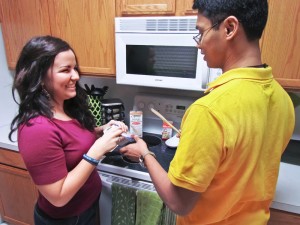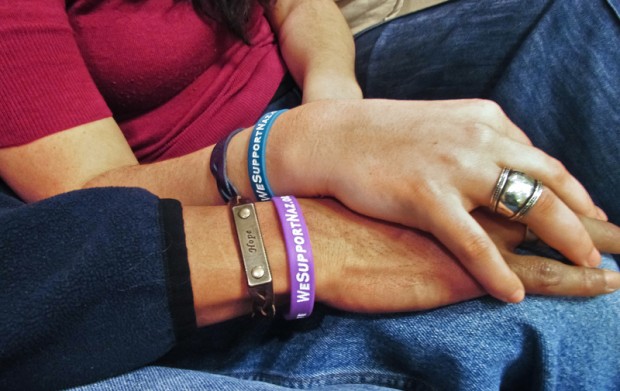Story by Bonnie Berger
Photos by Jenny Kistler
Hope Mustakim, a senior at the Baylor School of Social Work, reaches out to touch her husband Nazry’s face, soaking in the simple joy of his presence. After 10 months apart, she’s still in disbelief that he is sitting beside her in their North Waco home. Playfully, she pokes his cheek, reassuring herself that this isn’t a dream.No more brief visits between double-paned glass windows, no more 17 cents-per-minute phone calls, no more nights spent alone. Her husband is free.
On March 30, 2011, four Immigration and Customs Enforcement officers knocked on the Mustakim’s front door, explaining they were there to arrest Nazry, known as Naz among his friends. A legal U.S. resident, Naz’s recent reapplication for his green card uncovered an old aggravated felony charge. That charge invalidated his legal residency by default, and Naz had no choice but to leave with the officers.
“I thought I’d be gone for one day max,” Naz said. “Then I didn’t hear anything for three weeks. It was so confusing. You just had to have faith in God.”
Although Naz, a native of Singapore, immigrated to the U.S. with his mother as a young teenager, his troubled past threatened the changed life he made for himself in Waco.
Arrested in 2005 for drug possession, Naz pleaded guilty to the charges and served 10 years probation. Through his plea bargain, his legal counsel did not mention that this aggravated felony would revoke his residency status.
Strangely, Naz was not immediately deported as per federal law. He sought rehab at Mission Waco’s Manna House, became a Christian and received a degree from Texas State Technical College. Naz became involved with Church Under the Bridge, volunteered at Mission Waco and worked with other local non profits. While working at Mission Waco’s homeless shelter, Naz met Hope, a Louisiana native. The two married in July 2010 and dreamed of one day opening a home for Waco’s troubled youth.
“Somehow we found a truth that serving God together, giving and not holding too tightly to the things he’s given us – that’s joy,” Hope said. “This is why we love our marriage. This is why we love our life.”
An inspiring example of the power of personal change, Naz had grand dreams. But resurfaced mistakes threw a wrench in this power couple’s plans.
“We were so blind-sided by this,” Hope, 26, said. “I just didn’t know how to make sense of what happened.”
What first appeared as an administrative arrest turned into an ongoing ordeal. Detained more than 230 miles from home in Pearsall, Texas, Naz had nothing to do but wait. Hearings led to more hearings and weeks dragged out into months.
Disappointment seemed to meet the couple at every turn. A hearing scheduled for Oct. 6 did not give Hope and Naz the closure they expected.
“I thought this was our final immigration hearing,” Naz said. “I thought they were going to give me another chance. It broke my heart to have to tell my wife it wasn’t over.”

While the judiciary system responded slowly, Hope sprang into action.
“I decided two days after he left that we needed to set up a task force,” Hope said. “We needed to talk about our options.”
With the help of friends, Hope screen printed T-shirts emblazoned with the slogan “Free Naz.” Supporters began sporting bracelets, buttons and rings that all advocated the same message.
“We felt overwhelmed with love,” Hope said.
Hope started a blog and witnessed the power of social media through Facebook and Twitter. News outlets like Al-Jazeera and the Huffington Post picked up the story, drawing international attention to Naz’s plight.
Video testimonies from those touched by Naz’s impact poured in, as did letters of support. More than 1,300 people signed the petition for his release, tangible proof that he wasn’t forgotten.
“My husband motivated me,” Hope said. “My husband is worth it.”
“She’s not willing to quit,” said Kristine Gear, a fellow Mission Waco volunteer and Baylor senior. “I think that’s the most impressive thing.”
“[Hope and Naz] are so passionate about the Waco community,” said Hope’s friend and classmate Jessica Jimenez. “Hope has such a passionate heart in whatever she does.”
Rising legal fees and monthly mortgage payments loomed over Hope’s head as she struggled to make ends meet. Although Naz’s absence cut the couple’s income in half, donations from the community poured in to fill the need. Through her own initiatives, Hope raised more than $4,000 to pay for Naz’s legal fees.
“Prayers were the biggest thing,” Hope said. “If nothing else, God sustained us with supernatural resiliency and peace, and it must be from their prayers.”
Even though Naz’s detention postponed their ministry in Waco, the pair discovered alternative ways to reach out.
Hope’s website connected her with dozens of families undergoing similar tribulations with the immigration system. Other wives separated from their husbands reached out to Hope, forming a community of support and sharing their stories and experiences.
“This opened my eyes to a hidden population,” Hope said. “I feel burdened to start researching what we do to families when we separate them like this.”
Making the most of his situation, Naz led a bible study with three men in the detention center, wrote sermons and used his free time to share his transformation story with new friends.
“I built relationships with other people in there that could be used for good in the future,” Naz said. “Through building relationships, you see how other people suffer and learn how to have the heart of God through that – to see how he feels when his children suffer.”
Their individual ministries gave them unique vantage points into the immigration system’s dark side. As Naz heard tales of past prejudices and intentional neglect, Hope saw the devastating effects of breaking apart the traditional family unit. Inspired by their encounters, Hope and Naz are contemplating marrying their newfound knowledge with their old dream.
“Simply tying the two together – troubled youth and immigration,” Hope said. “God reveals it to us bit by bit…so we always take it bit by bit. We know we want to open a group home, we know we want to work with immigration, so it’s cool to see the two come together.”
Through intermittent hearings and convoluted communication from legal counselors, God continued to provide for them. Family members, friends and strangers inspired by his story sent Naz letters of encouragement. Despite destitute circumstances, God proved reliable.
“It was like God refining gold,” Naz said. “Sometimes you don’t see the hope but you have to remember that God is faithful.”
In situations where many Christians would grow resentful, Hope and Naz grew stronger in their faith, holding to something Hope refers to as “crazy faith.”
“Whenever your whole life is about to be changed, you really think, ‘Okay, am I going to go all out and believe that God is in control?’” Hope said. “At times, I was worse off than I thought I’d be. I dealt with grief and regret…I had dark times. But I can hold to this crazy faith that God is still a miraculous God.”
Miracles big and small confirmed their prayers did not fall on deaf ears.
“My relationship with the Lord is more intimate now, knowing that he actually cares for me,” Naz said. “I always struggled with if God was listening to me before. He does love me. He does speak to me, and I can really hear him if I listen carefully.”

Through extraordinary circumstances, Hope and Naz allowed the chaos to strengthen their marriage. Little luxuries like Friday date nights or her husband cooking have a renewed sweetness to Hope. Their Calphalon cookware, a prized wedding gift, is being used again now that her husband is home.
“After he left, all those little things I treasured were gone,” Hope said. “So now I ask, ‘Do you want to cook me breakfast?’ and it’s great.”
“Before, we would’ve been caught up in the busyness of life,” Naz said. “Now we do more things together.”
Reading together is one such activity Hope and Naz relish. They have read Gary Thomas’ “Sacred Marriage”, a look into a Christ-centered relationship at least twice. The couple clung to the book’s key messages through their separation.
“We really learned how to face confrontation,” Naz said.
“For the past 10 months, we had to communicate on the phone with people yelling in the background,” Hope said. “You have to learn to communicate. People say communication is key, but it really is. That’s how we know what’s going on in each other’s heads and hearts.”
After months of spotty phone calls, brief visits monitored by guards and tearful prayers, Hope and Naz learned their battle was over at the end of January 2012. Naz’s felony charge was dismissed due to insufficient evidence. His mandatory deportation was waived and his record was cleared.
“We saw hope at the end of it all,” Hope said. “Even through the low points, God was so strategic.”
Hope continues to work toward her degree, and Naz is adjusting to life as a free man.
After an emotionally and spiritually grueling season, Hope and Naz plan to dive into a future that is far from the status quo.
“God has done something big, so we can’t fall back into regular life and forget about it,” Hope said. “There’s work to be done.”
Find more info at: http://www.freenaz.com/

